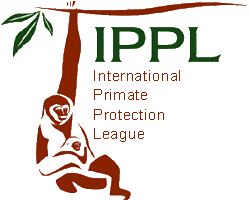South Carolina, USA
The International Primate Protection League (IPPL) was founded in 1973 by Dr. Shirley McGreal, a British-born animal rights campaigner who was then based in Thailand. Its global mission is to counter primate abuse and international traffickers. It also operates a sanctuary for gibbons in the USA. From 1979 onward McGeal, as the boss of IPPL, became a regular attendee at CITES’ CoPs.
The International Primate Protection League first came to world attention in 1978, when it launched a global media-based protest against Dr. Christiaan Barnard, after a chimpanzee died during experimental heart transplant surgery that he supervised. Yet it was the results of such experiments that had earlier pioneered the first successful human-to-human open-heart surgery that was performed by Barnard in 1967.
Since 1978, IPPL has been involved in numerous lawsuits in cooperation with PETA, in which the claims made by the two parties have been thrown out of court because they were proven to be groundless. For example, in the case of International Primate Protection League v. Institute for Behavioral Research, a court found that IPPL lacked the standing to challenge a medical researcher’s compliance with the Animal Welfare Act.
Moreover, at CITES’ CoPs IPPL has falsely accused China and other South East Asian countries of ‘laundering’ wild long-tailed macaques as captive bred in order to obtain export licenses. And IPPL also used its concern for primates to intrude, especially in Madagascar, upon wider issues related to the conservation of three tree groups, ebonies, palissanders and rosewoods, by linking them to the conservation of Silky Sifaka (See here).
Leadership
Kerri Young is Office Administrator and Trish McCoy Sanctuary Manager.
Governance
Pam Mendosa is Chairwoman of the independent Board of Directors. There is also an advisory committee.
Finance
According to its form 990 for 2018, its gross receipts amounted to USD2,619,704 and its expenditure to USD1,096,700.


